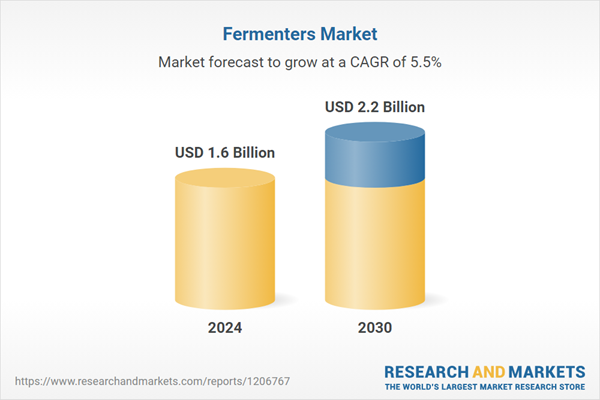Fermenters - Key Trends and Drivers
Fermenters, also known as bioreactors, are critical components in the production of a wide range of biotechnological products, including pharmaceuticals, biofuels, food and beverages, and industrial enzymes. These vessels provide a controlled environment for the growth and metabolic activities of microorganisms, cells, or enzymes, facilitating the large-scale production of desired products through fermentation processes. Fermenters are equipped with systems for maintaining optimal conditions such as temperature, pH, oxygen levels, and agitation, which are crucial for maximizing yield and productivity. The design and scale of fermenters vary significantly depending on the application, ranging from small laboratory-scale units for research and development to large industrial-scale units for commercial production. The versatility and efficiency of fermenters have made them indispensable in modern bioprocessing and biomanufacturing industries.The market for fermenters is influenced by several key trends and technological advancements. One significant trend is the increasing demand for biopharmaceuticals, including vaccines, monoclonal antibodies, and recombinant proteins, driven by the rising prevalence of chronic diseases and the need for advanced medical treatments. This demand has led to the development of advanced fermenters with enhanced capabilities for precision control and scalability. Another major trend is the growing interest in sustainable and renewable energy sources, such as biofuels, which has spurred the adoption of fermenters in bioethanol and biodiesel production. Technological innovations, such as the integration of automation and digital monitoring systems, have revolutionized the operation and efficiency of fermenters, enabling real-time data collection and process optimization. Additionally, the food and beverage industry continues to leverage fermenters for the production of fermented products like yogurt, beer, and soy sauce, where consistent quality and safety are paramount.
The growth in the fermenters market is driven by several factors. Technological advancements, such as the development of automated and digitally integrated fermenters, have significantly enhanced the efficiency and precision of fermentation processes, making them more viable for various industrial applications. The increasing demand for biopharmaceuticals and personalized medicine has expanded the addressable market for fermenters, as they are essential for the production of high-quality therapeutic products. Consumer behavior trends, including the rising preference for bio-based and sustainable products, have further propelled market growth. The expansion of the biofuel industry, driven by the global emphasis on reducing carbon emissions and achieving energy independence, has also played a crucial role in market expansion. Furthermore, the food and beverage industry's continuous innovation in product offerings and the growing popularity of fermented foods and beverages have sustained demand for fermenters. Overall, the convergence of technological innovation, increasing healthcare needs, and a shift towards sustainable industrial practices is driving robust growth in the fermenters market.
Report Scope
The report analyzes the Fermenters market, presented in terms of market value. The analysis covers the key segments and geographic regions outlined below.- Segments: Mode of Operation (Automatic, Semi-Automatic); Process (Fed-Batch, Batch, Continuous); Application (Beverages, Food, Healthcare & Cosmetics).
- Geographic Regions/Countries: World; United States; Canada; Japan; China; Europe (France; Germany; Italy; United Kingdom; Spain; Russia; and Rest of Europe); Asia-Pacific (Australia; India; South Korea; and Rest of Asia-Pacific); Latin America (Argentina; Brazil; Mexico; and Rest of Latin America); Middle East (Iran; Israel; Saudi Arabia; United Arab Emirates; and Rest of Middle East); and Africa.
Key Insights:
- Market Growth: Understand the significant growth trajectory of the Automatic Fermenters segment, which is expected to reach US$1.4 Billion by 2030 with a CAGR of a 5.6%. The Semi-Automatic Fermenters segment is also set to grow at 5.1% CAGR over the analysis period.
- Regional Analysis: Gain insights into the U.S. market, valued at $419.6 Million in 2024, and China, forecasted to grow at an impressive 9% CAGR to reach $480.4 Million by 2030. Discover growth trends in other key regions, including Japan, Canada, Germany, and the Asia-Pacific.
Why You Should Buy This Report:
- Detailed Market Analysis: Access a thorough analysis of the Global Fermenters Market, covering all major geographic regions and market segments.
- Competitive Insights: Get an overview of the competitive landscape, including the market presence of major players across different geographies.
- Future Trends and Drivers: Understand the key trends and drivers shaping the future of the Global Fermenters Market.
- Actionable Insights: Benefit from actionable insights that can help you identify new revenue opportunities and make strategic business decisions.
Key Questions Answered:
- How is the Global Fermenters Market expected to evolve by 2030?
- What are the main drivers and restraints affecting the market?
- Which market segments will grow the most over the forecast period?
- How will market shares for different regions and segments change by 2030?
- Who are the leading players in the market, and what are their prospects?
Report Features:
- Comprehensive Market Data: Independent analysis of annual sales and market forecasts in US$ Million from 2024 to 2030.
- In-Depth Regional Analysis: Detailed insights into key markets, including the U.S., China, Japan, Canada, Europe, Asia-Pacific, Latin America, Middle East, and Africa.
- Company Profiles: Coverage of players such as Asahi Kasei Corporation, Blue Foot Membranes, Chengdu Rosun Disinfection Pharmaceutical Co., Ltd., Cloacina, De.mem Pte., Ltd. and more.
- Complimentary Updates: Receive free report updates for one year to keep you informed of the latest market developments.
Some of the 18 companies featured in this Fermenters market report include:
- Applikon Biotechnology BV
- BBI-Biotech GmbH
- Bioengineering AG
- CerCell ApS
- Electrolab Biotech Limited
- Eppendorf AG
- GE Healthcare Life Sciences
- GEA Group AG
- Pierre Guerin SAS
- Sartorius AG
- Thermo Fisher Scientific, Inc.
- Zeta Holding GmbH
This edition integrates the latest global trade and economic shifts into comprehensive market analysis. Key updates include:
- Tariff and Trade Impact: Insights into global tariff negotiations across 180+ countries, with analysis of supply chain turbulence, sourcing disruptions, and geographic realignment. Special focus on 2025 as a pivotal year for trade tensions, including updated perspectives on the Trump-era tariffs.
- Adjusted Forecasts and Analytics: Revised global and regional market forecasts through 2030, incorporating tariff effects, economic uncertainty, and structural changes in globalization. Includes historical analysis from 2015 to 2023.
- Strategic Market Dynamics: Evaluation of revised market prospects, regional outlooks, and key economic indicators such as population and urbanization trends.
- Innovation & Technology Trends: Latest developments in product and process innovation, emerging technologies, and key industry drivers shaping the competitive landscape.
- Competitive Intelligence: Updated global market share estimates for 2025, competitive positioning of major players (Strong/Active/Niche/Trivial), and refined focus on leading global brands and core players.
- Expert Insight & Commentary: Strategic analysis from economists, trade experts, and domain specialists to contextualize market shifts and identify emerging opportunities.
Table of Contents
Companies Mentioned (Partial List)
A selection of companies mentioned in this report includes, but is not limited to:
- Applikon Biotechnology BV
- BBI-Biotech GmbH
- Bioengineering AG
- CerCell ApS
- Electrolab Biotech Limited
- Eppendorf AG
- GE Healthcare Life Sciences
- GEA Group AG
- Pierre Guerin SAS
- Sartorius AG
- Thermo Fisher Scientific, Inc.
- Zeta Holding GmbH
Table Information
| Report Attribute | Details |
|---|---|
| No. of Pages | 191 |
| Published | February 2026 |
| Forecast Period | 2024 - 2030 |
| Estimated Market Value ( USD | $ 1.6 Billion |
| Forecasted Market Value ( USD | $ 2.2 Billion |
| Compound Annual Growth Rate | 5.5% |
| Regions Covered | Global |









